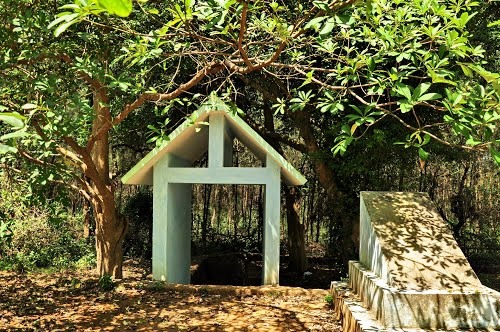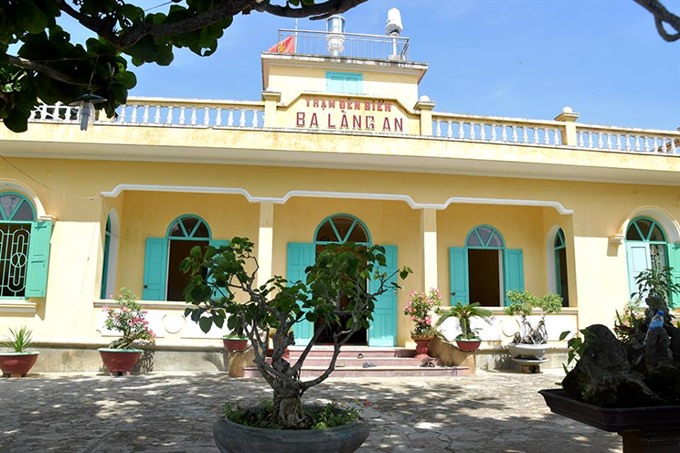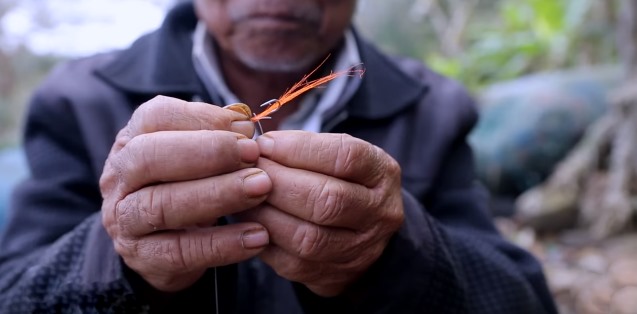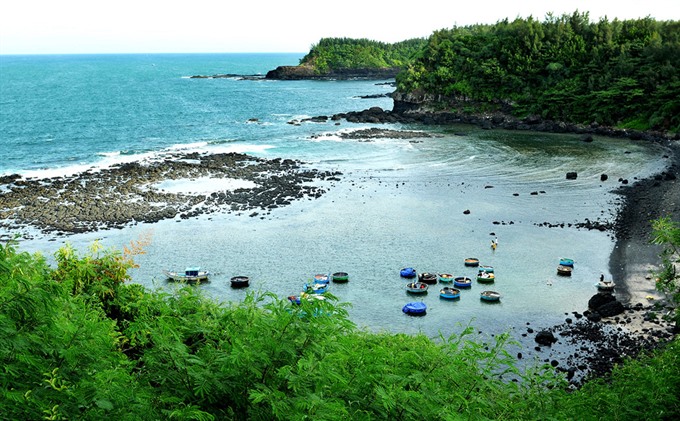 Life & Style
Life & Style

Another summer has come, and many tourists have flocked to Ba Làng An Peninsula to immerse themselves in the transparent blue water, listen to the musical sound of nature, wander around the unique ancients rocks and enjoy fresh seafood like abalone or cellana.
 |
| I’m going deeper underground: The entrance to Đám Toái Tunnel, a historical landmark in Ba Làng An Peninsula. — Photos taidanang.com |
Summer has come, and many tourists are flocking to Ba Làng An Peninsula to immerse themselves in the crystal clear water, listen to the musical sounds of nature, enjoy ancient rock formations, and eat fresh seafood.
Located in Bình Sơn District in the central province of Quảng Ngãi, Ba Làng An was know as Cap Batangan by locals during French colonial period.
It used to include three villages of An Hải, An Vĩnh and An Kỳ, which explains the meaning of its name in Vietnamese, which translates to: land of three villages called An.
 |
| Diamond in the sky: Ba Làng An lighthouse, built during the French colonial period, guides fishing boats safely back to shore. |
In order to reach the peninsula, visitors have to drive for about 20km along the newly-opened Mỹ Trà – Mỹ Khê expressway from Quảng Ngãi City, then follow the 24B highway before turning down a narrow path shaded by rows of almond trees. Visitors to the peninsula are greeted by a picturesque landscape.
From Ba Làng An Lighthouse, a building from the colonial period, take a walk to the bare hill, and take in a panoramic view of the whole peninsula.
A stunning view of transparent blue water carpeted by colourful coral reefs and overlapping heaps of basalt rocks that stretch out to sea will surely take anyone’s breath away. From this point, Lý Sơn Island and local fishing boats dotting the water can also be seen.
Next to Ba Làng An Peninsula is the 30 sq.m crater of an inactive volcano. The crater is lined with seaweed, while its exterior is surrounded by colourful coral reef blooming among the basalt rocks in various shapes and sizes, creating a unique scene that can only be found in Ba Làng An.
The locals here have been closely connected with sea for thousands of years. It not only provides them with a means to earn a living, but it has become like an intimate friend.
From the crack of dawn, fishermen start to row their boats ashore until midday, when they return to shore with heavy loads of a variety of fresh fish.
It is highly recommended that visitors to Ba Làng An join a fishing day with locals to experience their unique way of fishing. Normally, small fish or shrimp is used as bait by fishermen, but not by those in Ba Làng An. Instead, they use small pieces of colourful pearlescent paper.
A stunning view of transparent blue water carpeted by colourful coral reefs and overlapping heaps of basalt rocks that stretch out to sea will surely take anyone’s breath away. From this point, Lý Sơn Island and local fishing boats dotting the water can also be seen.
 |
| Get creative: Local fishermen in Ba Làng An use pieces of colourful pearlescent paper instead of small fish or shrimp as their fishing bait. |
This unique way of fishing is very effective. The sparkling pearlescent papers are mistaken by the fish as seaweed, their favourite food, and as a result the local fishermen catch bountiful loads.
If visitors want to taste a local specialty, they should try the tà ma fish sour soup, grilled shrimp or grilled fish. The boiled abalone or cellana tasted with ginger fish sauce and mint or perilla leaves are also very tasty dishes. Visitors can also prepare a heaty meal themselves by walking along the beach when the tide has gone down and using a knife to take the abalones and cellana off the rocks, or simply by fishing on a high rock to catch fish and grill them on the spot.
That’s not all Ba Làng An has to offer – Én Cave and Đám Toái Tunnel are also noteworthy destinations of the peninsula.
Én (swallow) Cave, dozens of metres wide, offers shelter to hundreds of swallows. As the path leading to the cave is small and bumpy, visitors are advised to go there with the assistance of a local guide. It should also be noted that the cave is only accessible when the tide has gone down, and visitors should keep an eye on the time to ensure their own safety.
 |
| Dormant monster: An aerial view of Ba Làng An Peninsula. The crater of an inactive volcano can be seen from ashore. |
Enjoying the cool atmosphere and the pleasant dripping of water onto the rocks below, Én Cave is a tranquil experience to behold.
A day visiting Ba Làng An Peninsula can be concluded with a visit to the historical landmark Đám Toái Tunnel. The area is a land of revolutionary tradition, where imprints still can be seen clearly in the tunnel. The 100m long, zig-zagging tunnel used to shelter locals and Vietnamese soldiers against enemies during the two resistance wars.
The primitive beauty of nature has tempted an increasing number of visitors to Ba Làng An Peninsula in recent years. However, the tourism potential of the area has not been properly developed, so there is a limited choice of restaurants or hotels for visitors who are considering spending the night there. — VNS




